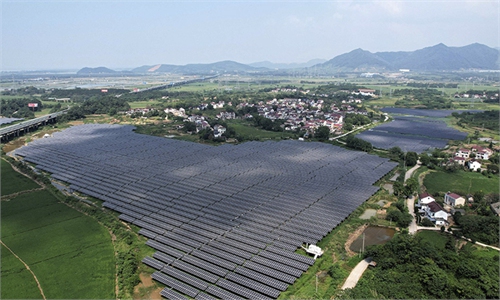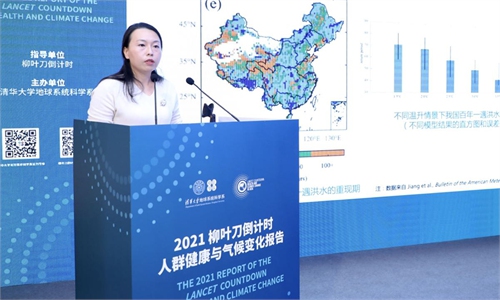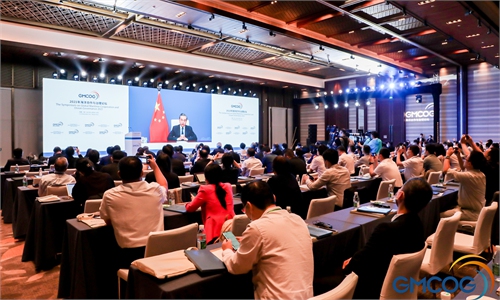IN-DEPTH / IN-DEPTH
Pressuring governments, fooling the public: Western polluters still obstruct green policies

Penguins are seen on an iceberg in Antarctica, Feb. 15, 2019. Photo:Xinhua
For decades, pollution-intensive industry giants, such as automotive, utility, manufacturing, petroleum and mining companies, have been a large contributor to the modernization and capital accumulation of the Western world. They are also among the main culprits for global climatic degeneration, observers said.
By putting pressure on governments and fooling the public with anti-science rhetoric - including describing global warming as a conspiracy - these companies formed organizations against climate action in the late 20th century, caring only about their own business interests instead of the common good of humankind, said climate experts and environmentalists reached by the Global Times.
Even today, when climate protection is gaining ground worldwide, some Western anti-emission reduction organizations still react negatively to efforts to rein in global warming and try to prevent administrators from passing eco-friendly policies, they warned.
A war raging for decades
A few developed countries, including the US and Australia, have been called "foot-draggers" by the international community for their unsatisfactory efforts to tackle climate change. According to data released by the World Bank in March, the per-capita carbon emissions of the US and Australia were 17.6 and 14.9 metric tons respectively, much more than China (6.4) and the global average of 4.5.
Although Australia has announced a commitment to achieving a target of net zero emissions by 2050, the country has not released detailed phased goals or corresponding policies.
One of the main obstacles facing the Australian government is the country's interest groups of pollution-intensive industries, said Chai Qimin, director of the Strategy and Planning Department at the National Center for Climate Change Strategy and International Cooperation.
"From former prime minister Kevin Rudd to current Prime Minister Scott Morrison, Australian authorities have tried several policies such as carbon taxes, most of which came to nothing," Chai told the Global Times.
The war between policymakers and industries on carbon tax has been raging for decades in Australia. In 1991, after then prime minister Bob Hawke promised that Australian GHG levels would be 20-percent below the 1988 levels by 2005 (also known as the "Toronto target"), he faced "intense lobbying" by industry giants and associations such as BHP Billiton, the Australian Coal Association and the Australian Mining Industry Council, according to an article published by Melbourne-based media outlet The Conversation in 2015.
The lobbying succeeded, the article said. "Emissions trading did not appear in the National Greenhouse Response Strategy agreed at the end of 1992," it added.
In July 2011, when former Prime Minister Julia Gillard announced a tax on carbon emissions, she also faced an angry backlash from domestic firms such as energy, petrochemical and other heavy industry enterprises. The tax was reversed two years later, and was replaced by a less-severe emissions trading scheme. In 2014, the senate voted by 39 to 32 votes to repeal the tax, making Australia the first developed nation to abolish a carbon tax, the Wall Street Journal reported.
Lobbying and propaganda campaign
At the ongoing COP26 summit, US President Biden apologized for the Trump administration's exit from the Paris climate agreement.
The exit put the US behind in its climate goals, Biden said. "It put us sort of behind the eight ball a little bit," he said.
The US' dilemma in climate action is due to its "see-saw approach to global climate agreements," the BBC said in an article earlier this month. "Americans know that whatever is agreed in Glasgow could be reversed by a Republican president in 2025," the article noted.
Similar to Australia, the US' heel-dragging in responding to climate change is partly down to the self-interest of the country's intensive-pollution industries, which have never stopped their lobbying and propaganda campaign across the decades, observers told the Global Times.
The Global Climate Coalition (GCC), for instance, is a lobbyist group that has reportedly opposed action to reduce emissions and publicly challenged the science behind global warming.
GCC membership spans pollution-intensive industries, such as autos, utilities, manufacturing, petroleum and mining. Its initial members contained the US' major polluters such as Shell, Ford, Mobil and Union Carbide. Union Carbide caused a deadly incident in India in 1984, when at least 15,000 local residents were killed by a poison gas leak from its factory there.
Together with its members, the GCC used "various strategies to defeat US ratification of the [Tokyo] Protocol," including "raising public concerns about unemployment resulting from emissions regulations," and "insisting that developing countries commit to the same stringent reductions as industrialized nations," according to an article authored by American lawyer Richard Rinkema.
To mislead the public, the GCC and its member companies frequently tried to discredit mainstream climate scientists, and promoted the work of climate change-denying scientists. "It began by attacking the science itself," wrote investigative journalist Karen Savage in an April 2019 article.
The GCC dissolved in 2001 under US domestic pressure. Nonetheless, another trade group, the National Association of Manufacturers (NAM), which was "a driving force behind the GCC" according to Savage, continues to defend the interests of the US fossil fuel industry. In 2018, the NAM launched the Main Street Investors Coalition (MSIC) against climate change-related proposals put forward by shareholders who were concerned about global warming and its influences.
The MSIC is a corporate-funded group with no real ties to retail investors, Nell Minow, an advisor and member of non-profit group 5050 Climate Project, wrote in a post on the Harvard Law School Forum on Corporate Governance in June 2018. "Its advocacy is as fake as its name," Minow wrote.



